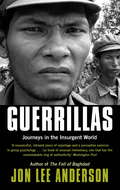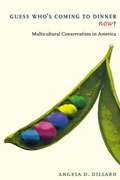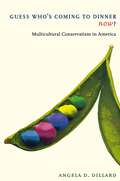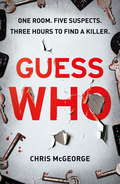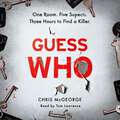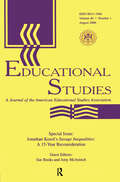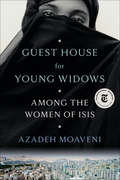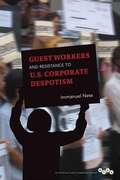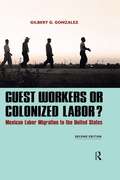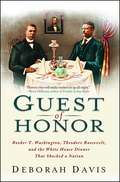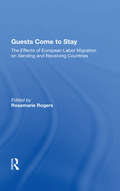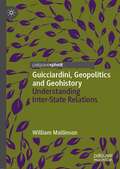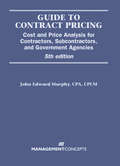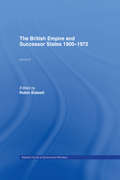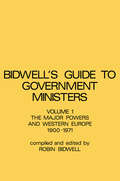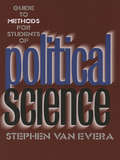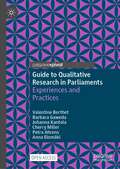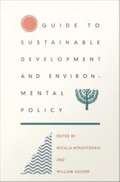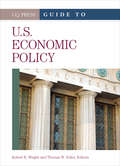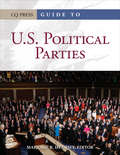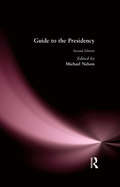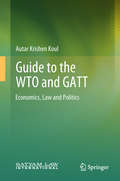- Table View
- List View
Guerrillas: Journeys in the Insurgent World
by Jon Lee AndersonPrior to gaining international renown for his definitive biography of Che Guevara and his firsthand reports on the war in Iraq in the acclaimed THE FALL OF BAGHDAD, Jon Lee Anderson wrote GUERRILLAS, a daring on-the-ground account of five diverse insurgent movements around the world: the mujahedin of Afghanistan, the FMLN of El Salvador, the Karen of Burma, the Polisario of Western Sahara, and a group of young Palestines fighting against Israel in the Gaza Strip. Making the most of unprecedented, direct access to his subjects, Anderson combines powerful storytelling with a balanced, penetrating analysis of each situation. A work of phenomenal range, analytical acuity, and human empathy, GUERRILLAS amply demonstrates why Jon Lee Anderson is one of our most important chroniclers of societies in crisis.
Guess Who's Coming to Dinner Now?: Multicultural Conservatism in America (American History and Culture #12)
by Angela D. DillardThe first comparative analysis of minority conservatismIn Guess Who's Coming to Dinner Now? Angela Dillard offers the first comparative analysis of a conservatism which today cuts across the boundaries of race, ethnicity, gender, and sexuality. To be an African-American and a conservative, or a Latino who is also a conservative and a homosexual, is to occupy an awkward and contested political position. Dillard explores the philosophies, politics, and motivation of minority conservatives such as Ward Connerly, Glenn Loury, Linda Chavez, Clarence Thomas, and Bruce Bawer, as well as their tepid reception by both the Left and Right. Welcomed cautiously by the conservative movement, they have also frequently been excoriated by those African Americans, Latinos, women, and homosexuals who view their conservatism as betrayal. Dillard's comprehensive study, among the first to take the history and political implications of multicultural conservatism seriously, is a vital source for understanding contemporary American conservatism in all its forms.
Guess Who: ONE ROOM. FIVE SUSPECTS. THREE HOURS TO FIND A KILLER.
by Chris McGeorgeONE ROOM. FIVE SUSPECTS. THREE HOURS TO FIND A KILLER.'An impressive debut' James Oswald**************GUESS WHO A waitress. A cleaner. An actress. A lawyer. A student. Everyone is a suspect.WHERE In a locked room - with no escape, and no idea how they got there. WHAT In the bathtub, the body of a man they all knew. Someone murdered him. Someone in this room. WHY They have three hours to find out. Or they all die. THE RULES ARE SIMPLE. THE GAME IS NOT Imagine Agatha Christie had created an interactive Escape the Room game, and GUESS WHO would be the result. For fans of the DI Helen Grace series by MJ Arlidge, The Lucky Ones by Mark Edwards, Ragdoll by Daniel Cole, and From the Dead by Mark Billingham.**************What readers are saying about this gripping thriller from the new king of the locked room mystery, Chris McGeorge:'Guess Who boils with claustrophobic intensity. Packed with gripping twists and turns, Guess Who is an inventive, entertaining locked room mystery that kept me utterly hooked.' Adam Hamdy, author of Pendulum'Aningenious twisty mystery in a totally unique setting.' Claire McGowan, author of The Lost'An impressive debut and a sign of great things to come.' James Oswald, author of Natural Causes'Chris McGeorge's Guess Who is a fresh take on the locked room murder mystery. The plotting is intricate, the characters well drawn, and the pace never lets up as it drives headlong to the surprising end.' David C. Taylor, Edgar-nominated, Nero Wolfe Award-winning author of Night Life'Guess Who is an incredibly satisfying, intelligent thriller running at break-neck pace right until it's closing pages. A marvellous debut.' Francesca Dorricott, author of After the Eclipse'To say that I found ithard to put down would be an understatement indeed. And when we got to the reveal, I was gobsmacked! Well done that author, take a bow. Not only is it a wholly satisfying, cracking read but, for a debut, it is also very brave and indeed impressive.' Amazon reviewer, 5 stars'The story is incredibly well-written; it's one of those books that once started, can't be put down. The plot is solid and character development is good. A perfect, modern-day Agatha Christie-esque novel.' Amazon reviewer, 5 stars'I must admit I am somewhat daunted at the prospect of writing a review for this book - it was so fantastic that I am not sure I can encapsulate just good it was in this review.' Amazon reviewer, 5 stars
Guess Who: ONE ROOM. FIVE SUSPECTS. THREE HOURS TO FIND A KILLER.
by Chris McGeorgeAt eleven years old, Morgan Sheppard solved the murder of his Maths teacher when everyone else believed it to be a suicide.Twenty-five years later...Morgan Sheppard wakes up handcuffed to a bed in an unfamiliar hotel room, with five strangers waking up around him. In the bathroom - a corpse. One of the people in the room is the killer and Sheppard has three hours to solve the murder. If he doesn't find the killer, they all die. As everyone in the room panics, Sheppard starts to unravel an impossible case, where the real mystery might stretch all the way back to his childhood.Read by Tom Lawrence(p) Orion Publishing Group 2018
Guest Editor'S Introduction Es V40#1: J.KOZOL'S SAVAGE INEQUALAIT.
by Sue Books Amy McAninchFirst published in 2006. Routledge is an imprint of Taylor & Francis, an informa company.
Guest House for Young Widows: Among the Women of ISIS
by Azadeh MoaveniA gripping account of thirteen women who joined, endured, and, in some cases, escaped life in the Islamic State—based on years of immersive reporting by a Pulitzer Prize finalist. Among the many books trying to understand the terrifying rise of ISIS, none has given voice to the women in the organization; but women were essential to the establishment of Abu Bakr al-Baghdadi’s caliphate. Responding to promises of female empowerment and social justice, and calls to aid the plight of fellow Muslims in Syria, thousands of women emigrated from the United States and Europe, Russia and Central Asia, from across North Africa and the rest of the Middle East to join the Islamic State. These were the educated daughters of diplomats, trainee doctors, teenagers with straight-A averages, as well as working-class drifters and desolate housewives, and they set up makeshift clinics and schools for the Islamic homeland they envisioned. Guest House for Young Widows charts the different ways women were recruited, inspired, or compelled to join the militants. Emma from Hamburg, Sharmeena and three high school friends from London, Nour, a religious dropout from Tunis: all found rebellion or community in political Islam and fell prey to sophisticated propaganda that promised them a cosmopolitan adventure and a chance to forge an ideal Islamic community where they could live devoutly without fear of stigma or repression. It wasn’t long before the militants exposed themselves as little more than violent criminals, more obsessed with power than the tenets of Islam, and the women of ISIS were stripped of any agency, perpetually widowed and remarried, and ultimately trapped in a brutal, lawless society. The fall of the caliphate only brought new challenges to women no state wanted to reclaim. Moaveni’s exquisite sensitivity and rigorous reporting makes these forgotten women indelible and illuminates the turbulent politics that set them on their paths.Advance praise for Guest House for Young Widows“In this searing investigation, Moaveni explores the phenomenon of Muslim women—many of them educated, successful, and outwardly Westernized—choosing to travel to Syria in support of jihad. . . . In concise, visceral vignettes, Moaveni immerses her readers in a milieu saturated with the romantic appeal of violence. The result is a journalistic tour de force that lays bare the inner lives, motivations, and aspirations of her subjects.”—Publishers Weekly (starred review)
Guest Workers and Resistance to U.S. Corporate Despotism
by Immanuel NessPolitical scientist Immanuel Ness thoroughly investigates the use of guest workers in the United States, the largest recipient of migrant labor in the world. Ness argues that the use of migrant labor is increasing in importance and represents despotic practices calculated by key U.S. business leaders in the global economy to lower labor costs and expand profits under the guise of filling a shortage of labor for substandard or scarce skilled jobs. Drawing on ethnographic field research, government data, and other sources, Ness shows how worker migration and guest worker programs weaken the power of labor in both sending and receiving countries. His in-depth case studies of the rapid expansion of technology and industrial workers from India and hospitality workers from Jamaica reveal how these programs expose guest workers to employers' abuses and class tensions in their home countries while decreasing jobs for American workers and undermining U.S. organized labor. Where other studies of labor migration focus on undocumented immigrant labor and contend immigrants fill jobs that others do not want, this is the first to truly advance understanding of the role of migrant labor in the transformation of the working class in the early twenty-first century. Questioning why global capitalists must rely on migrant workers for economic sustenance, Ness rejects the notion that temporary workers enthusiastically go to the United States for low-paying jobs. Instead, he asserts the motivations for improving living standards in the United States are greatly exaggerated by the media and details the ways organized labor ought to be protecting the interests of American and guest workers in the United States.
Guest Workers or Colonized Labor?: Mexican Labor Migration to the United States
by Gilbert G. GonzalezA decade of political infighting over comprehensive immigration reform appears at an end, after the 2012 election motivated the Republican Party to work with the Democratic Party's immigration reform agendas. However, a guest worker program within current reform proposals is generally overlooked by the public and by activist organizations. Also overlooked is significant corporate lobbying that affects legislation. This updated edition critically examines the new guest worker program included in the White House and Congressional bipartisan committee s immigration reform blueprints and puts the debate into historical and contemporary contexts. It describes how the influential U.S. Chamber of Commerce and the AFL-CIO agreed on guidelines for a new guest worker program to be included in the plan. Gonzalez shows how guest worker programs stand within a history of utilizing controlled, cheap, disposable labor with lofty projections rarely upheld. For courses in a wide variety of disciplines, this timely text taps into trends toward teaching immigration politics and policy.Features of the New Edition"
Guest of Honor
by Deborah DavisIn this revealing social history, one remarkable White House dinner becomes a lens through which to examine race, politics, and the lives and legacies of two of America's most iconic figures. In 1901, President Theodore Roosevelt invited Booker T. Washington to have dinner at the executive mansion with the First Family. The next morning, news that the president had dined with a black man--and former slave--sent shock waves through the nation. Although African Americans had helped build the White House and had worked for most of the presidents, not a single one had ever been invited to dine there. Fueled by inflammatory newspaper articles, political cartoons, and even vulgar songs, the scandal escalated and threatened to topple two of America's greatest men. In this smart, accessible narrative, one seemingly ordinary dinner becomes a window onto post-Civil War American history and politics, and onto the lives of two dynamic men whose experiences and philosophies connect in unexpected ways. Deborah Davis also introduces dozens of other fascinating figures who have previously occupied the margins and footnotes of history, creating a lively and vastly entertaining book that reconfirms her place as one of our most talented popular historians.
Guests Come To Stay: The Effects Of European Labor Migration On Sending And Receiving Countries
by Rosemarie RogersThis book analyzes the impact of thirty years of labor migration from the Mediterranean region and from Finland to western and northern continental Europe. The authors consider the effects on the host countries of the role foreign migrants play in host countries economies, the formation of new ethnic communities, choices made concerning the educati
Guicciardini, Geopolitics and Geohistory: Understanding Inter-State Relations (Palgrave Studies in International Relations)
by William MallinsonThis book demonstrates that geohistory is a more effective concept than geopolitics in understanding inter-state relations, at a time of considerable confusion in world affairs, and that Francesco Guicciardini’s thoughts are an efficient medium to demonstrate not only the inadequacies of geopolitics, but that a geohistorical approach can be a more responsible way of understanding international affairs. The book introduces a fresh approach, based on the individual, on which corporate characteristics and behaviour depend, often in the shape of state interests, which are unable on their own to predict actions driven by human behaviour. The book shows how show mainstream international relations theories are stuck in paradigms, inadequate in explaining why world politics is moving in a direction that nobody could predict even a decade ago. It shows how ideology can blur clear understanding. In short, it represents a new and intellectually refreshing approach and method in understanding, and tackling, the vagaries of relations between states.
Guide on Resource Revenue Transparency
by International Monetary FundA report from the International Monetary Fund.
Guide to Contract Pricing: Cost and Price Analysis for Contractors, Subcontractors, and Government Agencies
by John Edward MurphyPerform Contracting Successfully!This master reference — in its fifth edition — contains everything you need to know about government pricing rules and regulations in one easy-to-use volume.Guide to Contract Pricing: Cost and Price Analysis for Contractors, Subcontractors, and Government Agencies, Fifth Edition, explains how the government conducts business and walks you through every step of the contracting process. This fully updated edition includes a new chapter on the role of auditors in contract pricing as well as five new detailed appendices. You'll be able to:+ Master the steps of the sealed bid process+ Improve your skills at evaluating bids, proposals, and quotations+ Perfect your ability to analyze direct and indirect labor costs+ Improve your chances for securing a fair and reasonable price
Guide to Government Ministers: The British Empire and Successor States 1900-1972
by Robin BidwellFirst published in 1974. This book is divided into seven sections: Europe and the Arab World are both geographical units in addition to' having political ties, and therefore these are grouped the Ministers together by office: the Prime Ministers of all the countries are followed by the Foreign Ministers of all the countries.
Guide to Government Ministers: The Major Powers and Western Europe 1900-1071
by R.L. BidwellFirst Published in 1973. Routledge is an imprint of Taylor & Francis, an informa company.
Guide to Methods for Students of Political Science
by Stephen Van EveraStephen Van Evera greeted new graduate students at MIT with a commonsense introduction to qualitative methods in the social sciences. His helpful hints, always warmly received, grew from a handful of memos to an underground classic primer. That primer evolved into a book of how-to information about graduate study, which is essential reading for graduate students and undergraduates in political science, sociology, anthropology, economics, and history--and for their advisers. *How should we frame, assess, and apply theories in the social sciences? "I am unpersuaded by the view that the prime rules of scientific method should differ between hard science and social science. Science is science." *A section on case studies shows novices the ropes. *Van Evera contends the realm of dissertations is often defined too narrowly "Making and testing theories are not the only games in town. . . . If everyone makes and tests theories but no one ever uses them, then what are they for?" *In "Helpful Hints on Writing a Political Science Ph.D. Dissertation," Van Evera focuses on presentation, and on broader issues of academic strategy and tactics. *Van Evera asks how political scientists should work together as a community. "All institutions and professions that face weak accountability need inner ethical rudders that define their obligations in order to stay on course."
Guide to Qualitative Research in Parliaments: Experiences and Practices
by Johanna Kantola Petra Ahrens Anna Elomäki Valentine Berthet Barbara Gaweda Cherry MillerThis open access book is a hands-on guide on doing qualitative research in parliaments, exploring achievements and drawbacks for all. From early-career scholars looking for an ‘in’ to start their research to senior academics interested in methodological details, the book offers a novel approach to discussing qualitative methodologies. It presents unique insights based on a large-scale qualitative study in the European Parliament using interview and ethnographic data. Comprehensive yet accessible, the book accounts the step-by-step process of qualitative research in parliaments, offering a reflexive and analytical perspective that moves beyond a textbook or theory-only format.
Guide to Sustainable Development and Environmental Policy
by Natalia Mirovitskaya William AscherThe Guide to Sustainable Development and Environmental Policy is a comprehensive presentation of definitions, philosophies, policies, models, and analyses of global environmental and developmental issues. With a wealth of comparative, multidisciplinary, and geographically varied perspectives on environmental governance, it also provides detailed and balanced discussions about specific environmental issues. The guide combines formal, objective entries with critical commentaries that emphasize different opinions and controversies. With succinct explanations of more than a thousand terms, thoughtful interpretations by international experts, and helpful cross-referencing, this resource is designed to serve as a roadmap for understanding the issues and debates in the overlapping fields of environment and development. Intended for use by activists, journalists, policymakers, students, scholars, and interested citizens, the Guide to Sustainable Development and Environmental Policy will be a helpful tool for anyone trying to get a comprehensive look at the many environmental organizations, schools of thought, development programs, international environmental treaties, conventions, and strategies that have proliferated in the past few decades.
Guide to U.S. Economic Policy
by Robert E. Wright Thomas W. ZeilerGuide to U.S. Economic Policy shows students and researchers how issues and actions are translated into public policies for resolving economic problems (like the Great Recession) or managing economic conflict (like the left-right ideological split over the role of government regulation in markets). Taking an interdisciplinary approach, the guide highlights decision-making cycles requiring the cooperation of government, business, and an informed citizenry to achieve a comprehensive approach to a successful, growth-oriented economic policy. Through 30 topical, operational, and relational essays, the book addresses the development of U.S. economic policies from the colonial period to today; the federal agencies and public and private organizations that influence and administer economic policies; the challenges of balancing economic development with environmental and social goals; and the role of the U.S. in international organizations such as the IMF and WTO. Key Features: 30 essays by experts in the field investigate the fundamental economic, political, social, and process initiatives that drive policy decisions affecting the nation’s economic stability and success. Essential themes traced throughout the chapters include scarcity, wealth creation, theories of economic growth and macroeconomic management, controlling inflation and unemployment, poverty, the role of government agencies and regulations to police markets, Congress vs. the president, investment policies, economic indicators, the balance of trade, and the immediate and long-term costs associated with economic policy alternatives. A glossary of key economic terms and events, a summary of bureaus and agencies charged with economic policy decisions, a master bibliography, and a thorough index appear at the back of the book. This must-have reference for students and researchers is suitable for academic, public, high school, government, and professional libraries.
Guide to U.S. Environmental Policy
by Edmund Russell Sally K FairfaxGuide to U.S. Environmental Policy provides the analytical connections showing readers how issues and actions are translated into public policies and persistent institutions for resolving or managing environmental conflict in the U.S. The guide highlights a complex decision-making cycle that requires the cooperation of government, business, and an informed citizenry to achieve a comprehensive approach to environmental protection. The book’s topical, operational, and relational essays address development of U.S. environmental policies, the federal agencies and public and private organizations that frame and administer environmental policies, and the challenges of balancing conservation and preservation against economic development, the ongoing debates related to turning environmental concerns into environmental management, and the role of the U.S. in international organizations that facilitate global environmental governance. Key Features: 30 essays by leading conservationists and scholars in the field investigate the fundamental political, social, and economic processes and forces driving policy decisions about the protection and future of the environment. Essential themes traced through the chapters include natural resource allocation and preservation, human health, rights of indigenous peoples, benefits of recycling, economic and other policy areas impacted by responses to green concerns, international cooperation, and immediate and long-term costs associated with environmental policy. The essays explore the impact made by key environmental policymakers, presidents, and politicians, as well as the topical issues that have influenced U.S. environmental public policy from the colonial period to the present day. A summary of regulatory agencies for environmental policy, a selected bibliography, and a thorough index are included. This must-have reference for political science and public policy students who seek to understand the forces that U.S. environmental policy is suitable for academic, public, high school, government, and professional libraries.
Guide to U.S. Health and Health Care Policy
by Thomas R. OliverGuide to U.S. Health and Health Care Policy provides the analytical connections showing students how issues and actions are translated into public policies and institutions for resolving or managing health care issues and crises, such as the recent attempt to reform the national health care system. The Guide highlights the decision-making cycle that requires the cooperation of government, business, and an informed citizenry in order to achieve a comprehensive approach to advancing the nation’s health care policies. Through 30 topical, operational, and relational essays, the book addresses the development of the U.S. health care system and policies, the federal agencies and public and private organizations that frame and administer those policies, and the challenges of balancing the nation’s health care needs with the rising costs of medical research, cost-effective treatment, and adequate health insurance. Key Features: The 30 topical essays investigate the fundamental political, social, economic, and procedural initiatives that drive health and health care policy decisions affecting Americans at the local, regional, and national levels Essential themes traced throughout the chapters include providing access to health care, national and international intervention, nutrition and health, human and financial resource allocation, freedom of religion versus public policy, discrimination and health care policy, universal health care coverage, private health care versus publicly funded health care, and the immediate and long-term costs associated with disease prevention, treatment, and health maintenance A Glossary of Key Health Care Policy Terms and Events, a selected Master Bibliography, and a thorough Index are included. This must-have reference for political science and public policy students who seek to understand the issues affecting health care policy in the U.S. is suitable for academic, public, high school, government, and professional libraries.
Guide to U.S. Political Parties
by Ms Majorie R. HersheyThis one-volume reference presents the major conceptual approaches to the study of U.S. political parties and the national party system, describing the organization and behavior of U.S. political parties in thematic, narrative chapters that help undergraduate students better understand party origins, historical development, and current operations. Further, it provides researchers with in-depth analysis of important subtopics and connections to other aspects of politics. Key Features: Thematic, narrative chapters, organized into six major parts, provide the context, as well as in-depth analysis of the unique system of party politics in the United States. Top analysts of party politics provide insightful chapters that explore how and why the U.S. parties have changed over time, including major organizational transformations by the parties, behavioral changes among candidates and party activists, and attitudinal changes among their partisans in the electorate. The authors discuss the way the traditional concept of formal party organizations gave way over time to a candidate-centered model, fueled in part by changes in campaign finance, the rise of new communication technologies, and fragmentation of the electorate. This book is an ideal reference for students and researchers who want to develop a deeper understanding of the current challenges faced by citizens of republican government in the United States.
Guide to the Presidency
by Michael NelsonThe Guide to the Presidency is an extensive study of the most important office of the U.S. political system. Its two volumes describe the history, workings and people involved in this office from Washington to Clinton.The thirty-seven chapters of the Guide, arranged into seven distinct subject areas (ranging from the origins of the office to the powers of the presidency to selection and removal) cover every aspect of the presidency. Initially dealing with the constitutional evolution of the presidency and its development, the book goes on to expand on the history of the office, how the presidency operates alongside the numerous departments and agents of the federal bureaucracy, and how the selection procedure works in ordinary and special cicumstances.Of special interest to the reader will be the illustrated biographies of every president from Washington to the present day, and the detailed overview of the vice-presidents and first ladies of each particular office. Also included are two special appendices, one of which gathers together important addresses and speeches from the Declaration of Independence to Clinton's Inaugural Address, and another which provides results from elections and polls and statistics from each office.
Guide to the WTO and GATT: Economics, Law and Politics
by Autar Krishen KoulThis book analyzes how today's system of international trade law and international economic relations has evolved over the last six decades. Focusing on the major innovations that came with the inception of the World Trade Organization (WTO) with its various agreements in 1994, it also provides in-depth commentary on the intense debate over important matters that remain unsettled. Topics covered include the WTO dispute settlement mechanism; the General Agreement on Trade in Services (OATS); the Agreement on Trade-Related Investment Measures (TRIMS); intellectual property rights – the Agreement on Trade-Related Aspects of Intellectual Property Rights (TRIPS); areas still covered by the General Agreement on Tariffs and Trade (GATT) 1947; the Most Favoured Nation (MFN) concept; special provisions relating to agriculture and textiles; sanitary and phytosanitary measures; technical barriers to trade; pre-shipment inspection; and import licensing procedures. The book would be an excellent resource for scholars as well as practitioners working in the field of international arbitration and trade laws.
